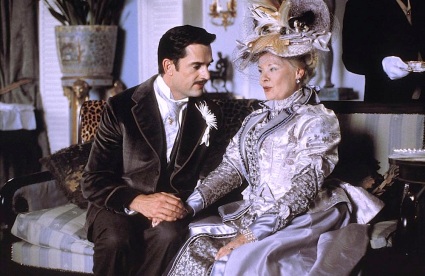From Act 1
ALGERNON. Oh! there is no use speculating on that subject. Divorces are made in Heaven—(Jack puts out his hand to take a sandwich. Algernon at once interferes.) Please don’t touch the cucumber sandwiches. They are ordered specially for Aunt Augusta. (Takes one and eats it.)
JACK. Well, you have been eating them all the time.
ALGERNON. That is quite a different matter. She is my aunt. (Takes plate from below.) Have some bread and butter. The bread and butter is for Gwendolen. Gwendolen is devoted to bread and butter.
JACK. (Advancing to table and helping himself.) And very good bread and butter it is too.
ALGERNON. Well, my dear fellow, you need not eat as if you were going to eat it all. You behave as if you were married to her already.
(Wilde, 72-73)
Passage Explained
As in this passage, The  Importance of Being Earnest is consistently fraught with the unrestrained consumption of food, poor handling of finances, and a general lack of self-discipline. Food in particular, functions metaphorically to suggest “a life of selfish, excessive, erotic gratification” (“Appendix” 200), and it is through this theme that Wilde makes a deliberate mockery of the value that Victorian society placed on self-discipline. The pairing of unbridled appetites for food with the idea of marriage serves to connect the dots between indiscipline and eroticism, a commentary which can hardly read without comparison to Wilde’s not-so-secret homosexuality and life of decadent entertaining at the Savoy Hotel (197).
Importance of Being Earnest is consistently fraught with the unrestrained consumption of food, poor handling of finances, and a general lack of self-discipline. Food in particular, functions metaphorically to suggest “a life of selfish, excessive, erotic gratification” (“Appendix” 200), and it is through this theme that Wilde makes a deliberate mockery of the value that Victorian society placed on self-discipline. The pairing of unbridled appetites for food with the idea of marriage serves to connect the dots between indiscipline and eroticism, a commentary which can hardly read without comparison to Wilde’s not-so-secret homosexuality and life of decadent entertaining at the Savoy Hotel (197).
Food is employed symbolically throughout the play and always in context of power conflicts. Just as food is connected to eroticism and indiscipline, it is also “used as a weapon of domination; as in [the cucumber scene], when Algernon, whose food it is, directs Jack’s choice” (Stone 38). This association of power with food draws clear connections between sex, materialism and domination. Sexuality as a form of power, is specifically brought into question by the overt equation of women with material objects. The food, which is here intended for absent female characters, is gobbled up by Jack and Algernon, who consider themselves—by association—entitled to property intended for the women (39). This by no means implies that Wilde himself intended any feminist subtext, but rather, suggests a general condemnation of typical Victorian views on sexuality and their connection to societal power structures.